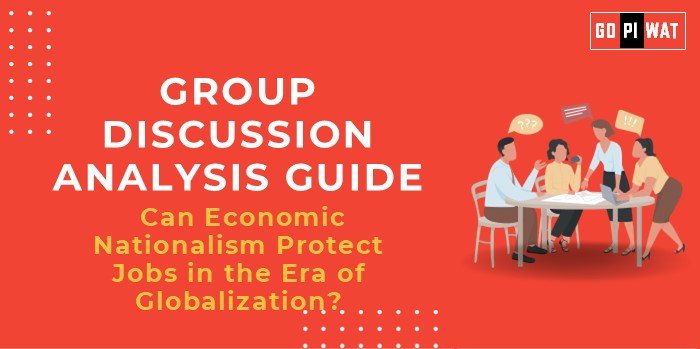📋 Group Discussion (GD) Analysis Guide
🌟 Topic: Can Economic Nationalism Protect Jobs in the Era of Globalization?
🌐 Introduction to Economic Nationalism
Opening Context: The rise of economic nationalism represents a critical response to globalization’s impact on local industries and job markets. Amid shifting geopolitical and economic trends, nations are reevaluating policies to prioritize domestic employment and industry growth.
Topic Background: Economic nationalism emphasizes prioritizing domestic over foreign interests through trade protectionism, subsidies, and strategic industrial policies. Its resurgence is driven by globalization-induced job losses, especially in manufacturing, as industries relocate to low-cost economies. Recent examples include U.S. tariffs on Chinese imports and Brexit-driven protectionist measures.
📊 Quick Facts and Key Statistics
- Global Trade Growth: Slowed to 2.5% in 2023, down from 4.4% in 2022 (WTO, 2024).
- Job Automation: 14% of global jobs are at high risk due to automation, exacerbated by globalization trends (OECD, 2023).
- U.S. Tariffs on China: $370 billion of Chinese imports subject to U.S. tariffs since 2018.
- India’s PLI Scheme: Attracted ₹2.4 lakh crore investments in 2023, boosting local manufacturing.
👥 Stakeholders and Their Roles
- Government Agencies: Formulate and implement protectionist policies to support local industries.
- Global Corporations: Often resist restrictions, seeking global supply chain efficiencies.
- Local Workforce: Directly impacted by outsourcing and automation; benefit from policies like tariffs and subsidies.
- International Bodies: WTO and IMF mediate disputes and encourage balanced trade.
✅ Achievements and Challenges
- Achievements:
- Domestic Industry Growth: India’s PLI scheme has boosted electronics manufacturing by 75% in three years.
- Job Creation: U.S. steel tariffs resulted in a modest revival of domestic steel jobs.
- Resilience: Countries like Japan diversified supply chains to reduce dependence on single sources like China.
- Challenges:
- Retaliation Risks: Trade wars, such as U.S.-China tensions, disrupt global supply chains.
- Higher Consumer Costs: Protectionist policies often increase prices of goods.
- Global Competition: Risks isolating countries from global trade benefits, as seen in Brexit’s impacts.
💬 Structured Arguments for Discussion
- Supporting Stance: “Economic nationalism secures jobs by reducing reliance on foreign markets and fostering domestic industries.”
- Opposing Stance: “Protectionism increases costs for consumers and hampers innovation by reducing global competition.”
- Balanced Perspective: “While economic nationalism can safeguard jobs temporarily, sustainable employment requires a balance between protectionism and globalization.”
🗨️ Effective Discussion Approaches
- Opening Approaches:
- Highlight a global trend: “Globalization, once the harbinger of prosperity, now faces pushback as nations prioritize domestic jobs.”
- Use a case study: “India’s PLI scheme exemplifies how economic nationalism drives growth in strategic sectors.”
- Counter-Argument Handling:
- Example: “While tariffs protect jobs, they can backfire when trading partners impose retaliatory tariffs. A focus on skill development may be more sustainable.”
📈 Strategic Analysis of Strengths and Weaknesses
- Strengths: Encourages local job creation, reduces dependency on volatile global markets.
- Weaknesses: Risk of trade wars, reduced economic efficiency.
- Opportunities: Strategic industries like EVs and semiconductors.
- Threats: Global retaliation, limited competitiveness.
🎓 Connecting with B-School Applications
- Real-World Applications: Economic nationalism links to courses on trade policies, international business, and global strategy.
- Sample Interview Questions:
- “What are the pros and cons of economic nationalism in developing economies?”
- “How can countries balance globalization with local industry protection?”
- Insights for B-School Students:
- Explore how protectionism impacts business strategy.
- Analyze case studies of successful national industrial policies.


